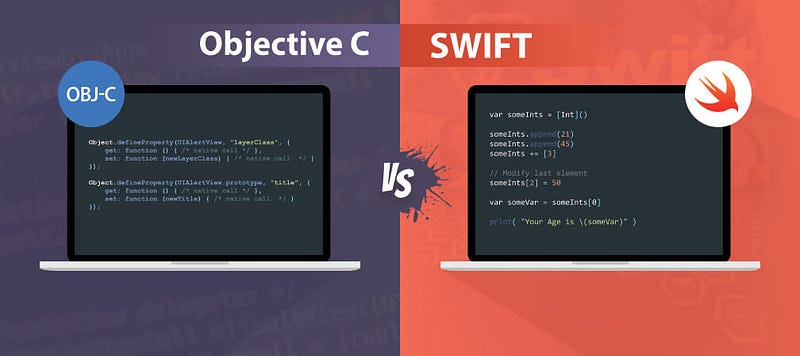iOS Interview Prep 3: Difference between Objective-C and Swift
These are basic to advanced questions asked in interviews, let me give you top 9 questions you might be asked during interviews.

1. What is the main difference between Objective-C and Swift?
Answer: The main difference is that Objective-C is an older, dynamic, and reflective programming language while Swift is a newer, statically typed, and more modern language. Swift was designed to be safer, faster, and more concise than Objective-C.
2. How does Swift handle optionals compared to Objective-C?
Answer: In Swift, optionals are a type-safe way to handle nil values and ensure that nil doesn’t lead to runtime crashes. They’re a core part of the language and are indicated using the `?` symbol. In Objective-C, nil is a common source of bugs and crashes, as methods can be called on nil objects without any warnings.
3. How does Swift improve memory management over Objective-C?
Answer: Swift uses Automatic Reference Counting (ARC) for memory management, automatically managing memory allocation and deallocation for objects. Objective-C, on the other hand, uses manual memory management with retain, release, and autorelease.
4: Explain the difference in syntax between Objective-C and Swift for method calls.
Answer: In Objective-C, method calls are done using square brackets, like `[object methodName]`. In Swift, method calls are more natural and resemble function calls, like `object.methodName()`.
5: What is the advantage of Swift’s type inference over Objective-C’s static typing?
Answer: Swift uses type inference to determine the type of a variable at compile time, reducing the need for explicit type declarations and making the code more concise. Objective-C requires explicit type declarations for variables.
6: How does Swift handle error handling compared to Objective-C?
Answer: Swift introduced a robust error handling model using the `try`, `catch`, and `throw` keywords. This allows developers to handle errors in a more structured and readable manner. Objective-C’s error handling is typically done using return values or error pointer parameters.
7: Can you provide an example of code that demonstrates the syntax difference between Objective-C and Swift?
Answer: Sure! Here’s an example of a simple class definition and method call in both languages:
Objective-C:
// MyClass.h
@interface MyClass : NSObject
- (void)printMessage;
@end
// MyClass.m
@implementation MyClass
- (void)printMessage {
NSLog(@"Hello from Objective-C");
}
@endSwift:
class MyClass {
func printMessage() {
print("Hello from Swift")
}
}Question 8: How does Swift handle type checking and type casting compared to Objective-C?
Answer: In Swift, type checking and type casting are safer and more expressive. The is and as keywords are used for type checking and type casting respectively. Swift's type casting handles both upcasting and downcasting, ensuring type safety at compile-time. In Objective-C, type checking and casting are typically done using isKindOfClass: and typecasting using (Type *).
9: Explain how Objective-C’s “Dynamic Dispatch” compares to Swift’s “Static Dispatch”.
Answer: In Objective-C, method calls are resolved at runtime through dynamic dispatch, where the actual method to be called is determined based on the runtime type of the object. In Swift, most method calls are resolved at compile-time through static dispatch, where the method is determined at compile-time based on the declared type of the object. This results in faster method calls in Swift but may limit some runtime flexibility compared to Objective-C’s dynamic dispatch.
These answers should give you a good starting point for understanding the differences between Objective-C and Swift. Remember that the specific interview questions and answers might vary depending on the interviewer’s focus and the role you’re applying for.
Thank you for reading!
I trust that this article will serve as a valuable asset in your journey towards interview preparation.
If you found the article helpful, kindly share it and offer a round of applause to help others discover it 👏👏👏👏👏 !
Feel free to leave a comment below suggesting the next topic for which you’d like to receive similar question insights.





